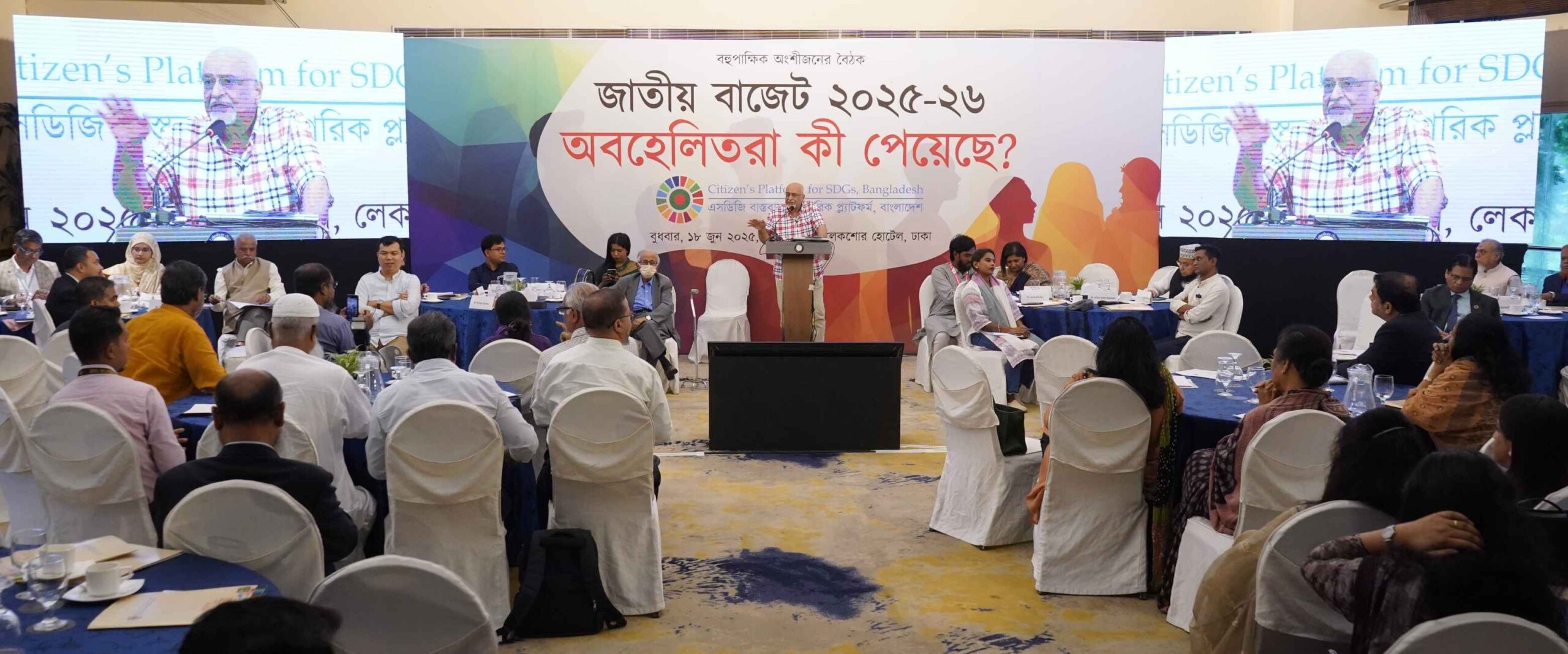
Citizen’s Platform for SDGs, Bangladesh, organised a multistakeholder dialogue titled “National Budget 2025–26: What is There for the Left-behinds?” on 18 June 2025 to critically examine the newly proposed national budget and its implications for marginalised communities and the broader economy.
While public discourse around the FY2025–26 budget has focused on allocative priorities, tax reforms, and institutional issues, this discussion aimed to go deeper—questioning whether the budget meaningfully addressed economic stabilisation, employment recovery, and the pressing needs of marginalised populations.
The welcome address was delivered by Dr Debapriya Bhattacharya, Convenor, Citizen’s Platform for SDGs, Bangladesh and Distinguished Fellow, Centre for Policy Dialogue (CPD). He noted that, =”This government came into power through a big change. On this ground, people had a huge expectation from this budget. But the budget failed to address people’s aspirations. So, the budget of expectations has become the budget of disappointment.”
 Mr Towfiqul Islam Khan, Senior Research Fellow at the Centre for Policy Dialogue (CPD), was the keynote presenter at the dialogue. He expressed concern that the budget did not reflect a systematic approach to the recommendations put forward by the White Paper Committee, the Task Force and the Reform Commission. He added that the core expectations from the budget were to strengthen macroeconomic stability, incorporate reform, protect marginalised citizens, and promote employment and investment, areas that were not adequately addressed. “There is a striking disconnect between budgetary initiatives and reform efforts,” he noted.
Mr Towfiqul Islam Khan, Senior Research Fellow at the Centre for Policy Dialogue (CPD), was the keynote presenter at the dialogue. He expressed concern that the budget did not reflect a systematic approach to the recommendations put forward by the White Paper Committee, the Task Force and the Reform Commission. He added that the core expectations from the budget were to strengthen macroeconomic stability, incorporate reform, protect marginalised citizens, and promote employment and investment, areas that were not adequately addressed. “There is a striking disconnect between budgetary initiatives and reform efforts,” he noted.
Mr Khan further observed that key structural and institutional reforms were “hardly reinforced” in the proposed Tk 790,000 crore budget for the next fiscal year, which is approximately one percent lower than the outgoing fiscal year’s allocation. He pointed out that the budget ignored the provisional estimates from the Bangladesh Bureau of Statistics (BBS) and instead relied on overestimated targets for the ongoing fiscal year (FY25). He said it is too ambitious as achieving the five per cent GDP growth target would require 6.7 per cent growth in the second half of FY25. Even reaching a four per cent target would necessitate a 4.7 per cent growth rate in the same period.
He highlighted a significant gap between projected private sector investment and the government’s credit growth target. Based on BBS’s provisional estimates, private investment would need to grow by 21.6 per cent in FY26, whereas the target for private sector credit growth stands at only 11 per cent, substantially lower than the current level.
Mr Khan also expressed scepticism over the government’s aim to bring inflation down from nine per cent to 6.5 per cent within a year. He warned that this would likely require a continuation of a conservative monetary policy, maintaining high policy and interest rates, which in turn would raise the cost of private investment.
He criticised the budget process for lacking “inclusivity and rigour”, despite some stakeholder consultations. “Political actors were completely ignored and data transparency remains poor,” he remarked.
The keynote presentation was followed by reflections from the Expert Panel.
Dr Selim Raihan, Professor of the Department of Economics, University of Dhaka and Executive Director of South Asian Network on Economic Modelling (SANEM), expressed concern that the budget did not prioritise incorporating reform proposals and it is a missed opportunity to initiate change. He added that the government was expected to raise direct tax, lower indirect tax and provide higher allocation for the health and education sectors, but that did not happen. Citing the targets for private investment, GDP growth and revenue collection, he said, “It is also not clear what the government would do to bring back macroeconomic stability. Many targets were set in the budget that are not realistic.” He added, “Entrepreneurs are living in uncertainty and they are suffering from a lack of confidence, which was not addressed in the budget.”
Eminent Economist Mr Zia Hassan, in his speech, questioned whether the country is truly experiencing economic growth or, in reality, facing a contracting economy. He also raised concerns about the accuracy of official inflation figures. Emphasising that the budget serves as the foundation of any policy change, he remarked that many large corporations have seen declining sales due to inflation, a reality not acknowledged in the budget proposal.
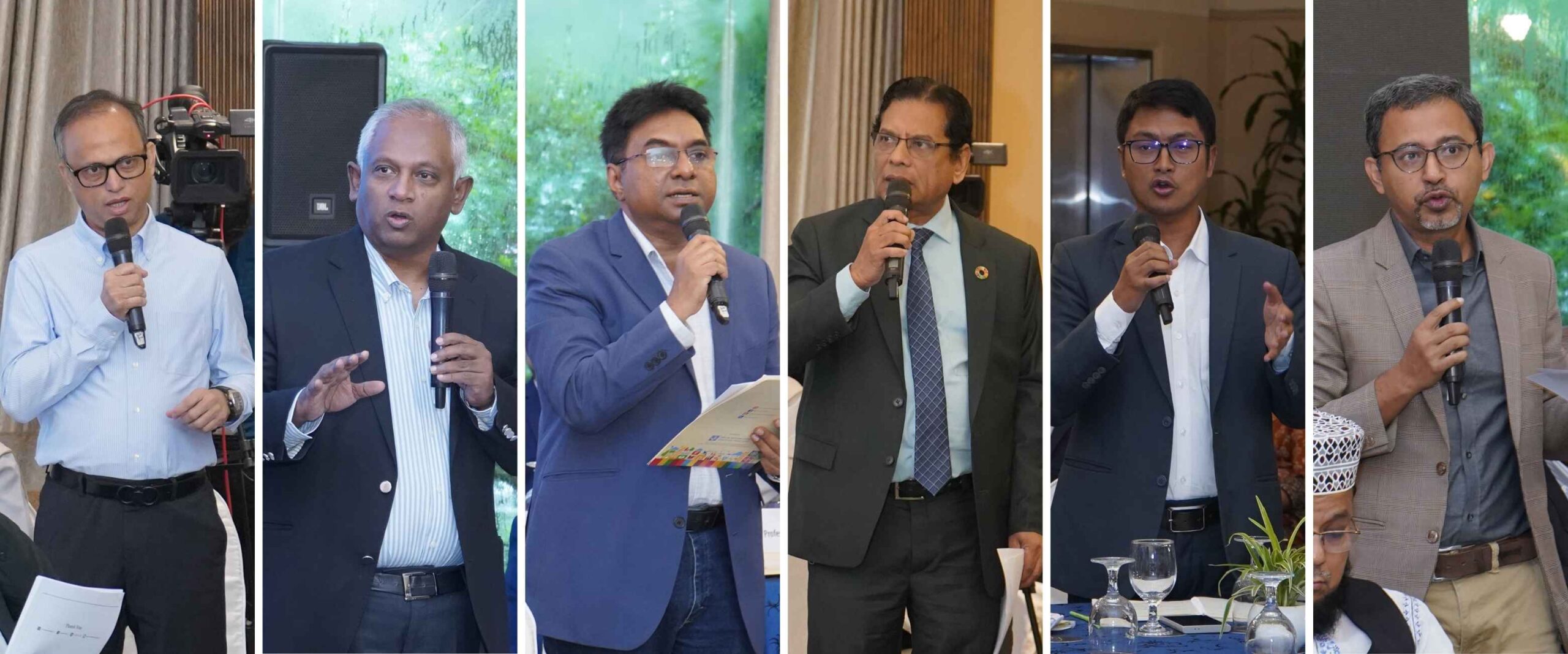
Mr Snehasish Barua, FCA, Chartered Accountant and Founder, Snehasish Mahmud & Co., highlighted that due to financing deficit, dependency on loans is increasing. Both the government and the private sector are fighting for loans. Due to political and global unrest, there is a lack of investment, resulting in a decline in employment generation. He added that the government could have reduced its operational expenses in this budget.
Mr Mahmud Hasan Khan, President, Bangladesh Garments Manufacturers and Exporters Association (BGMEA), questioned the rationale for increasing the salaries of government service-holders. He emphasised the need to reduce wastage and curb corruption in budget implementation, arguing that such measures would enable the government to do more for marginal communities. He cited the case of a family that has 11 TCB cards to further his point and said that if the cards were distributed properly, 10 additional families could have benefited.
Mr Mahtab Uddin Ahmed FCMA, President of the Institute of Cost and Management Accountants of Bangladesh (ICMAB), remarked that, “We often prefer to stay within our comfort zones. However, meaningful reform inevitably brings discomfort. This budget, unfortunately, has not generated any such discomfort.” He noted that in the past, political parties were frequently blamed for budgetary shortcomings due to their vested interests. “But in the case of an interim government,” he questioned, “who should we hold accountable?” He suggested that the bureaucracy may be a critical part of the problem. Touching on key economic concerns such as investment, employment, training costs and inflation, he asserted that the proposed budget has ultimately worked against the interests of the marginalised.
Professor Mustafizur Rahman, Core Group Member, Citizens’ Platform and Distinguished Fellow, Centre for Policy Dialogue (CPD), expressed concern over the current structure of personal income tax, noting that it disproportionately burdens the middle class compared to high-income earners. “Rather than reducing inequality, we are heading in the opposite direction,” he warned. “The income of the wealthy continues to grow, while middle-income groups fall further behind.” He also pointed out that, in real terms, allocations for social security have declined due to inflation. Although the Interim Government has increased social safety net allowances, the rise remains below the inflation rate. “With such a structure,” he questioned, “how can we expect to reduce discrimination and disparity?”
Remarks from the expert panel were followed by Reflection from the Representatives of LNOB Groups. The panel included members from Adivasi, Dalit, people with Disability, gender diverse communities, migrant workers and other disadvantaged groups.
Ms Samina Yasmin, Director, Strengthening Movements and Leadership, Bonhishikha, highlighted that the gender budget remains constrained, with limited financing, fewer ministries involved, and inadequate allocation for monitoring its implementation.
Mr Jahid Kabir, Lead – Field Implementation and Local Engagement, Youth for Change Bangladesh Foundation, emphasised that young people at the grassroots level remain isolated from the national budget and policy-making processes.
“Mr Md. Zafar Sadique, Advisor– Investment in Children, Save the Children International, commended the mid-day meal initiative but expressed concern over the declining social safety net programs for children, particularly those targeting street children.”
Indigenous Rights Activist Mr Trijinad Chakma called for an increase in the per-capita allocation of indigenous c, which has communities, noting that it has been declining over the years.
Ms Sarshathi Das, Project Officer (Community Engagement and Mobilisation) at Nagorik Uddyog, highlighted the housing crisis faced by Dalit communities and emphasised that employment is currently their most pressing need of this community, particularly for those who have completed higher education.
Ms Sanjiboni Sudha, Former Banker and Executive Director of Inclusive Bangladesh, stated that the budget contains no specific provisions for the transgender community. She noted that, while some token measures exist, transgender individuals in rural areas are often unaware of any such allocations. She also expressed concern over the lack of safety and support for elderly transgender persons.
Mr Partha Hefaz Shaikh, Director of Policy and Advocacy, WaterAid Bangladesh, highlighted the reduction in the budget allocated to the WASH sector. He pointed out that, even when allocations exist, proper utilisation of funds is often lacking, leaving rural areas particularly disadvantaged.
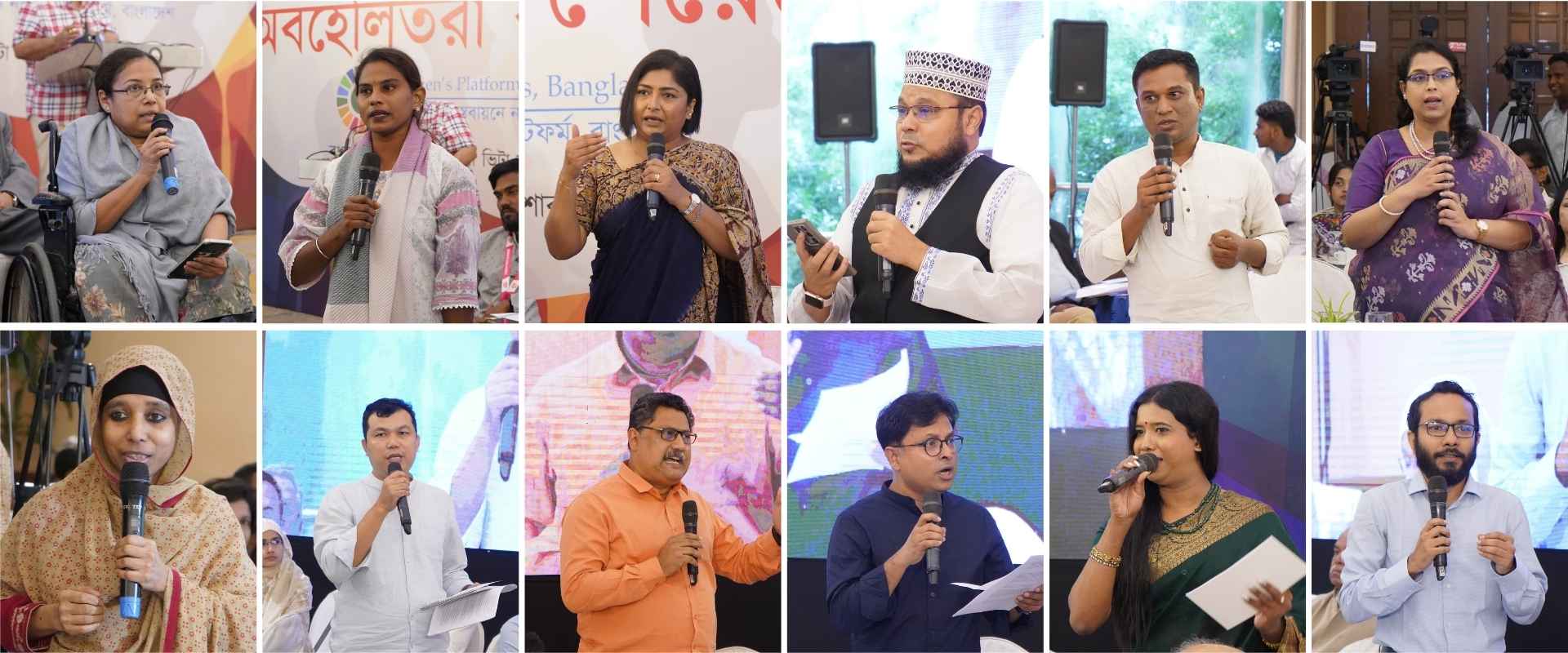
Mr Ariful Islam Nadeem, Joint General Secretary of the Bangladesh Rickshaw Van Easy Bike Labour Union, stated that there are no provisions in the budget to support entrepreneurs. He emphasised that informal workers are largely excluded from budgetary considerations, with no initiatives in place to ensure pension or social security for them.
Mr Tafsir M. Awal, Chairman of Multimode Transport Consultants Ltd., remarked that a more modern budget had been anticipated from the Interim Government. He criticised the lack of focus on increasing revenue, noting that the budget should be more pragmatic, particularly given that Bangladesh has one of the lowest tax-to-GDP ratios.
Dr Md Khalilur Rahman Madani, Principal, Tamirul Millat Kamil Madrasah, stated that despite the outstanding academic performance of madrasah students, there is no distinct allocation for them in the education budget. He added that Islamic and Arabic universities receive little to no government support, with inadequate funding, no teacher training programmes.
Mr Shakirul Islam, Chairperson, Ovibashi Karmi Unnayan Program (OKUP), stated that the budget allocation for migrant workers is lower than that of the previous year and disproportionately small compared to the remittances they generate. He noted the absence of provisions for health and security, highlighting a lack of social protection and limited access to justice for migrant workers.
Ms Salma Mahbub, General Secretary, Bangladesh Society for the Change and Advocacy Nexus (B-SCAN), stated that there is no work plan aligned with the Convention on the Rights of Persons with Disabilities (CRPD), which Bangladesh has ratified. She emphasised that employment opportunities, access to work, and transportation are key components of the convention that have not been reflected in the budget. While the budget includes several positive initiatives for persons with disabilities, she noted the absence of training programmes for their caregivers.
The Citizens Panel reflected their views after the discussion.
Mr Anowarul Haq, Assistant Resident Representative, UNDP Bangladesh, noted several positive aspects of the budget, including the school feeding programme, increased old-age allowances and targeted food security initiatives for vulnerable groups. However, he expressed concern over the decline in allocations for education and health. He also highlighted that issues concerning gender, youth and Adivasi communities have not been prioritised. Additionally, while there are allocations focused on youth, these are overly centralised, with no specific provisions for entrepreneurship development or vocational training.
Mr Asif Ibrahim, Core Group Member of the Citizen’s Platform and Vice-Chairman of the NewAge Group of Industries, acknowledged that some initiatives have been introduced for small and medium enterprises (SMEs). However, he noted that the allocation for start-ups remains insufficient. He expressed concern that increased taxes on importers and new VAT and tax regulations will disproportionately affect SMEs. He also highlighted that raising taxes on e-commerce will harm this growing sector.
Mr Syed Sultan Uddin Ahmed, Head of the Labour Reform Commission and Executive Director of the Bangladesh Institute of Labour Studies (BILS), said, “The government did not take the commission’s recommendations seriously – I feel betrayed”. He added that the budget could have helped reduce social inequality by implementing proposals put forward by various reform commissions.
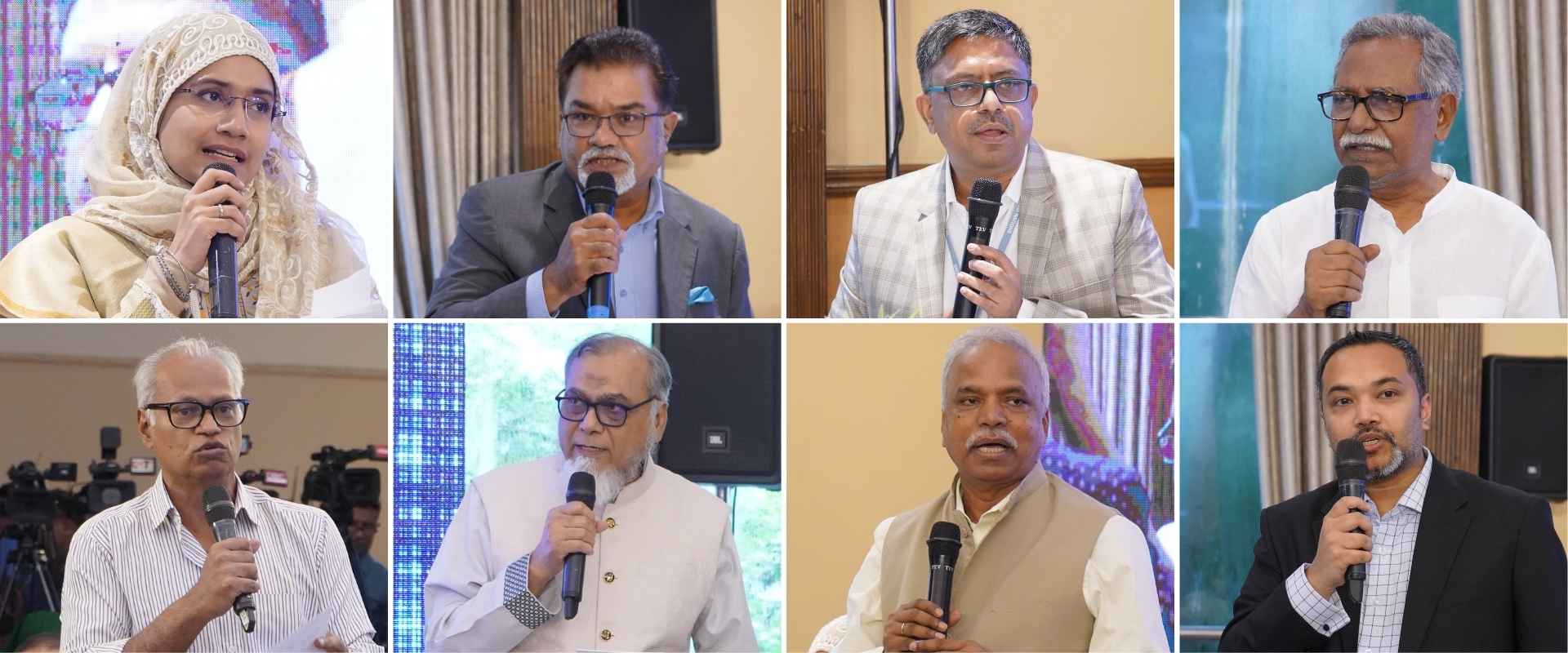
Mr Saiful Alam Khan Milon, Member of the Central Executive Council of Bangladesh Jamaat-e-Islami, proposed considering Zakat as a source of revenue collection. He also suggested facilitating the migration of semi-skilled labourers, particularly paramedics. Additionally, he emphasised that without political party consensus, meaningful reform will not take place.
Ms Samantha Sharmin, Senior Joint Convenor, National Citizen’s Party, stated that the current budget is inadequate for driving economic reform or transformation and fails to reflect the aspirations of the students and people’s movements. She noted that there was no consultation with political parties during the budget formulation process, nor is there any consideration of the recommendations made by various reform commissions. Furthermore, she criticised the lack of allocation for research, innovation and other critical sectors.
Dr Mahdi Amin, Adviser to the Acting Chairman of the Bangladesh Nationalist Party (BNP), opined that the budget is not inclusive, describing it as little more than a series of value adjustments to previous budgets. He added, “This budget fails to address how public confidence will be restored or how industrial capacity can be enhanced. Had the government sought recommendations, the BNP would have been willing to provide them.”
Eminent economist Professor Anu Muhammad, former Professor in the Department of Economics, Jahangirnagar University, remarked that, as this is an interim government, the implementation of reform measures cannot be expected. He further added, “I did not have high hopes that it would implement reforms, but I did expect it to at least initiate reform activities, such as reducing the VAT burden. However, no such changes have been introduced.”
Dr Debapriya Bhattacharya, in his concluding remarks, emphasised that the budget preparation process was flawed due to a lack of consultation. He described the budget structure as largely unchanged from previous years and highlighted a lack of transparency and accountability.


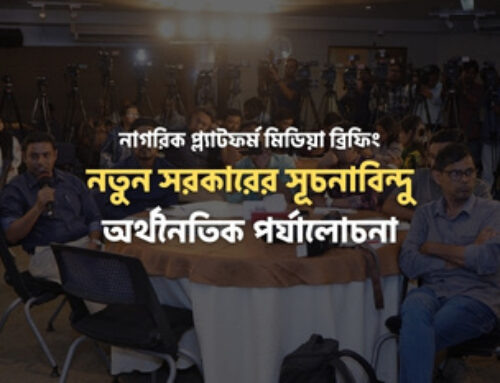
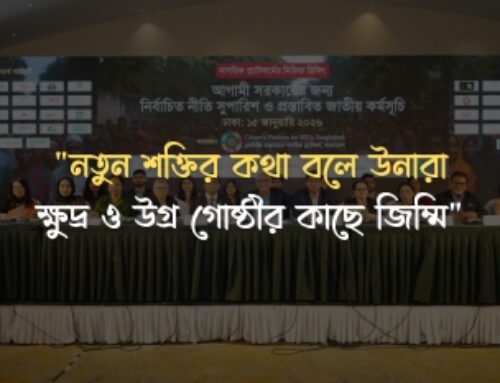
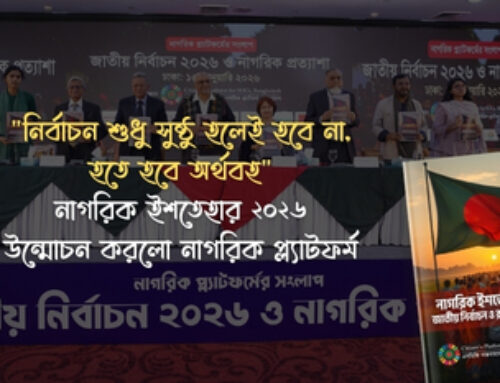
Leave A Comment